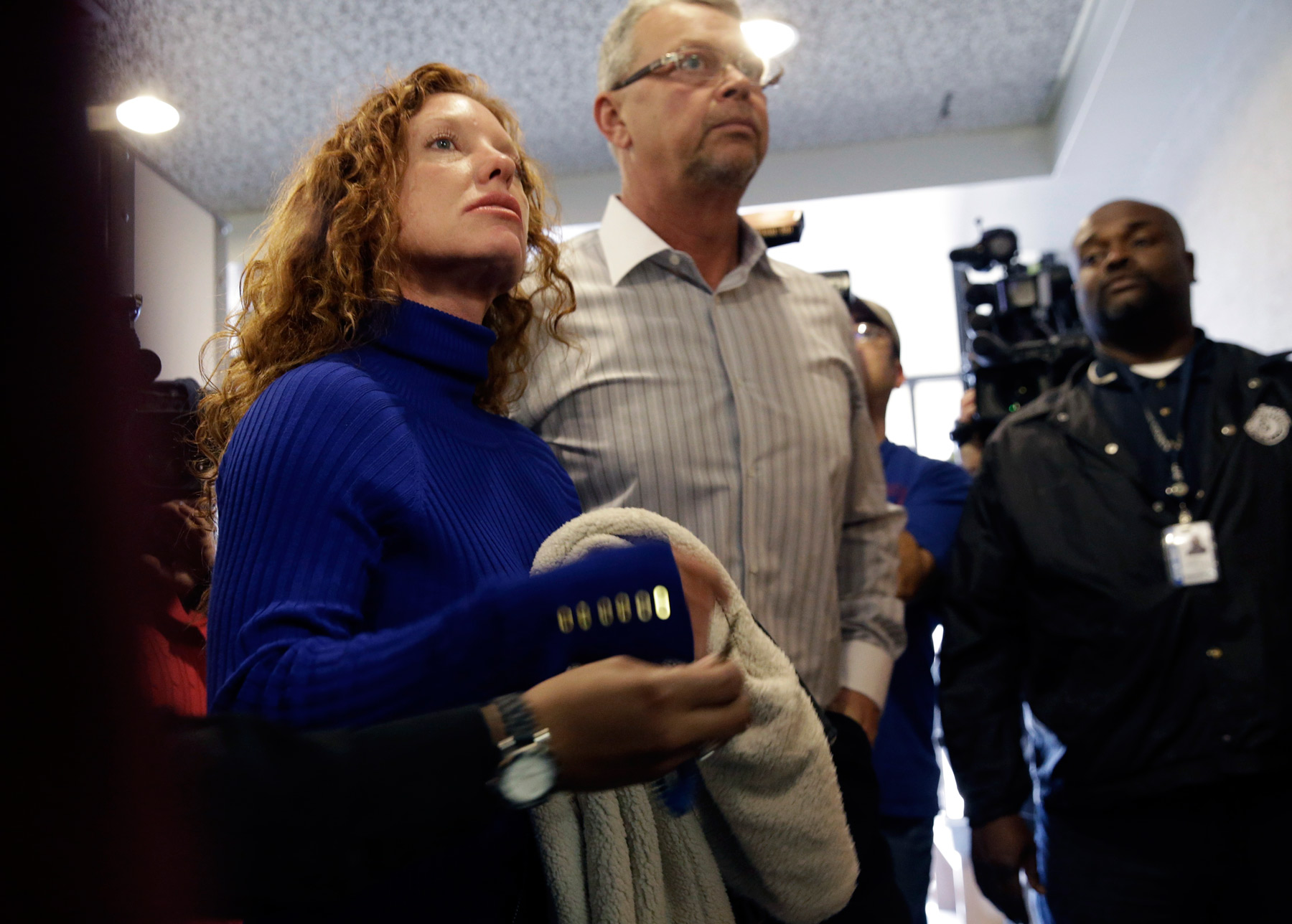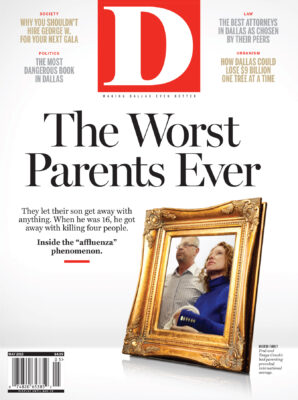On her way home from work, Breanna Mitchell swerved off the road. A tire blew on her white Mercury Mountaineer. The car knocked over a mailbox and ended up in the grass at the edge of a front lawn on Burleson-Retta Road, a two-lane, unlit blacktop without shoulders that cuts through a bucolic neighborhood outside Fort Worth. Nearby was a golf course and a private airport. Breanna was a 24-year-old chef at a private club, and though she loved her job, it often had her working late. That night, Saturday, June 15, 2013, it was past 11 when Hollie and Eric Boyles and their 21-year-old daughter, Shelby, came out of their house to help.
Within minutes, Brian Jennings, a youth minister returning from his son’s graduation party, stopped his pickup on the side of the road and offered assistance. He told the two middle-school-age boys in his truck to keep their seat belts on. Breanna was on the phone with her mom, explaining what had happened. As the group assessed the damage to her car, Eric moved his upturned mailbox into his garage.
That’s where he was when he heard the crash. A neighbor who was watching a movie with headphones on heard it, too, and came out into the street to investigate. Another neighbor nearly half a mile away thought he’d heard an explosion.
A red Ford F-350 was going more than 70 mph when it barreled out of the darkness, off the road, and into the grass, slamming into the Mountaineer and then Breanna, Hollie, Shelby, and Brian, killing them all. The truck, loaded with six teenagers in the cab and two in the bed, then hit the pickup with the two buckled-up boys, and flipped into a tree. The collision sent the minister’s pickup into the road, where it hit an oncoming Volkswagen Beetle.
Recordings of seven 911 calls, placed within four minutes of each other, capture the chaos. A woman tells the operator she has just driven up to the scene of an accident and then interrupts herself: “Oh, there’s another child in the ditch!” The operator tells her to stop screaming and asks how many cars are involved. “Ma’am, I can’t tell,” the woman says. “It’s dark! There’s kids laying in ditches! There’s kids laying in the street!” In the background there is moaning.
On another recording, a man is overheard telling his son to sit down and pray, to not look at the carnage. “Who is that?” the boy asks. Then: “Oh, my God!” The operator asks the father how many people are injured, and the father starts to count: “One, two, three—multiple. I don’t even know how many.”
Another call comes from a drunken teenage boy. “We need some ambulances,” he says, slurring. “It’s bad. We flipped and—” He pauses as he sees body parts in the street. “Oh, God.” The operator asks how many people need help. “Dude,” the boy says, “I have no idea.”
Burning rubber and gasoline vapor filled the air. Pieces of mangled metal and human remains were scattered over nearly 300 feet of road. A Tarrant County Sheriff’s deputy said the scene “looked more like a plane crash than a car wreck.”
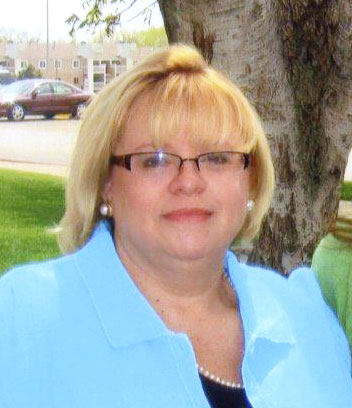
Ethan eventually pleaded guilty to four counts of intoxication manslaughter for killing Breanna, Hollie, Shelby, and Brian, and two counts of intoxication assault for the two teenagers who were injured when they were thrown from the bed of the truck as it flipped. But his defense lawyers presented a surprising argument during his sentencing hearing. Describing how the boy had been a victim of his own family’s wealth and how he had grown up without repercussions for bad behavior, a psychologist used the word “affluenza.” After three days of testimony, Judge Jean Boyd sentenced Ethan, the spoiled kid who had wrought such pain and destruction, not to prison, but to time in a cushy California rehab and 10 years of probation.
The case—and that portmanteau, “affluenza”—sparked national outrage. “It’s disgusting!” Dr. Drew Pinsky told CNN’s Anderson Cooper. “It’s a cute, clever twist of a phrase that the psychologist should be ashamed of himself for having brought in the courtroom. And even more shameful is the judge for having fallen for that nonsense.” This was the son of a well-off family escaping consequences by saying he’d always avoided consequences. It was proof of separate justice systems in this country, one for the rich and another for the poor, and Ethan became the face of wealth and privilege.
His parents, Tonya and Fred Couch, have declined to comment publicly. But court documents stretching back more than a decade tell the disturbing story of how, with the perfect combination of indulgence, addiction, abuse, and neglect, they created a nightmare.
•••
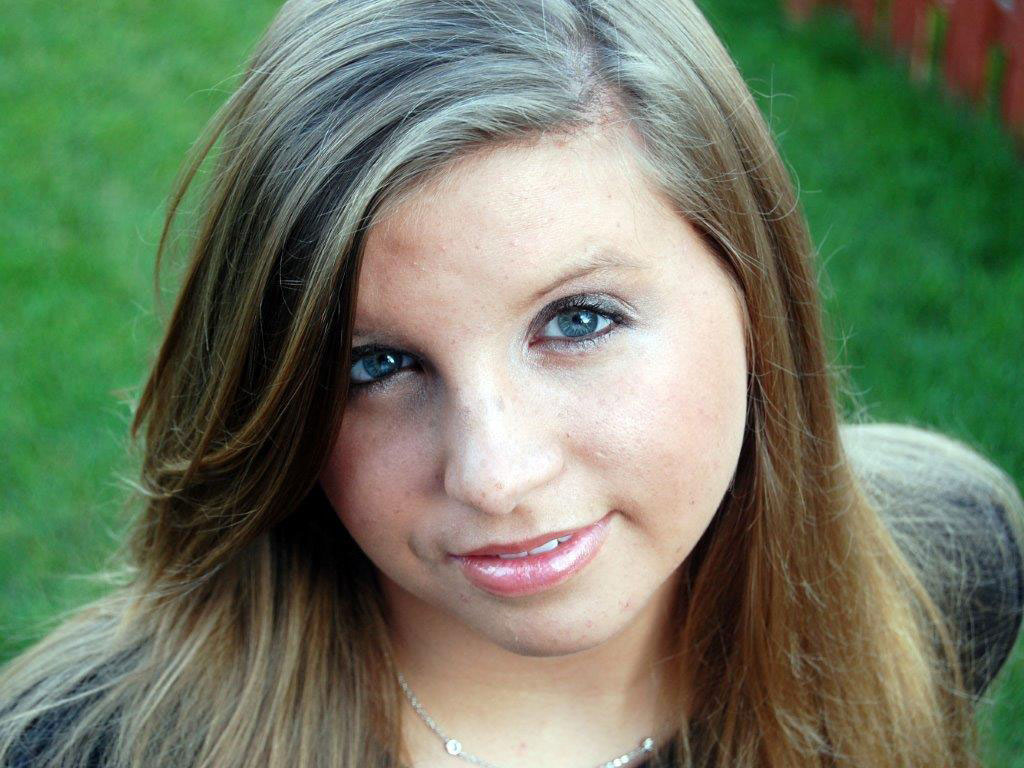
When Fred and Tonya divorced, in 2006, the court ordered psychological evaluations of them and Ethan. A social worker was assigned to interview Fred and Tonya separately and to talk to Ethan at both homes. The subsequent report runs nine pages.
Fred told the social worker that their marriage had been a “mistake from the start.” He said that Tonya had a pill addiction and that she’d given Vicodin to Ethan more than once. He said that she’d threatened to commit suicide and that she referred to 9-year-old Ethan as her “protector.” At the time, Ethan slept most nights in a separate bed his mother moved into her bedroom.
Tonya said the marriage ended because Fred had been verbally and physically abusive. She said he’d call her names, that he often grabbed her by the hair, and that he once “threw her into a fireplace.” She said Fred pushed and choked the daughter from her first marriage and that during a fight he’d threatened to “burn the house down.” Ethan’s half-sister told the social worker that she had seen Fred “slap her mother when she was pregnant with Ethan.” Tonya also accused him of having multiple affairs and manipulating family members with money.
The police were called to their house often—including during the social worker’s visit with Fred—and though officers occasionally advised Fred to leave the residence, there were no arrests. Fred was arrested at one point when he punched someone on a construction site, but he didn’t serve time.
Both parents admitted that they never followed court-mandated visitation schedules. Ethan mostly lived with his mother in a 4,000-square-foot ranch house in Burleson, the home the family had shared from the time Ethan was 3 until his parents filed for divorce. It sits on 6 acres and has a pool, a playground, a barn, and a 6,000-square-foot workshop out back. An open floor plan and a large wet bar made the house great for entertaining. Fred would stop by a few times a week, and once in a while Ethan would stay with his father, though Tonya said Fred “doesn’t properly supervise Ethan.” Fred’s response: “I am not a mom.”
Teri Flamming lives next door to the Burleson house. “They were decent neighbors,” she says of the Couches. But in this neighborhood, she says, people generally keep to themselves. Most of the houses have big fences. Most of the driveways have tall gates. When her girls were little, they sometimes played with Ethan. She says he was “just a polite, normal child.”
The social worker also described Ethan as “polite” and “patient.” Ethan told the social worker that his favorite subjects in school were math and PE. He said he liked school and maintained good grades, despite being absent 50 days during his kindergarten year and more than 40 days of his second-grade year. Little Ethan loved his parents and wanted to see his dad more, but said that he “wants to feel secure.” He said his parents yelled at each other a lot, and he wished they “wouldn’t put him in the middle.”
At the conclusion of the report, the social worker wrote, “Fred and Tonya Couch continue to exhibit a high degree of animosity and conflict.” The biggest concerns were “the codependent relationship Ethan has with his mother and the father’s lack of a regular and consistent relationship with Ethan,” along with the fact that “both parents have ‘adultified’ Ethan and have allowed him to become overly involved in adult issues and decisions.”
Ethan had his own motorcycle and four-wheeler, but during his interviews, he was more eager to show the social worker his bedroom and the fenced area in the backyard where the dogs lived. As Fred talked to the police that day, the social worker stayed with Ethan, noting that the little boy “appeared to be indifferent to the presence of the police cars and officers.”
•••
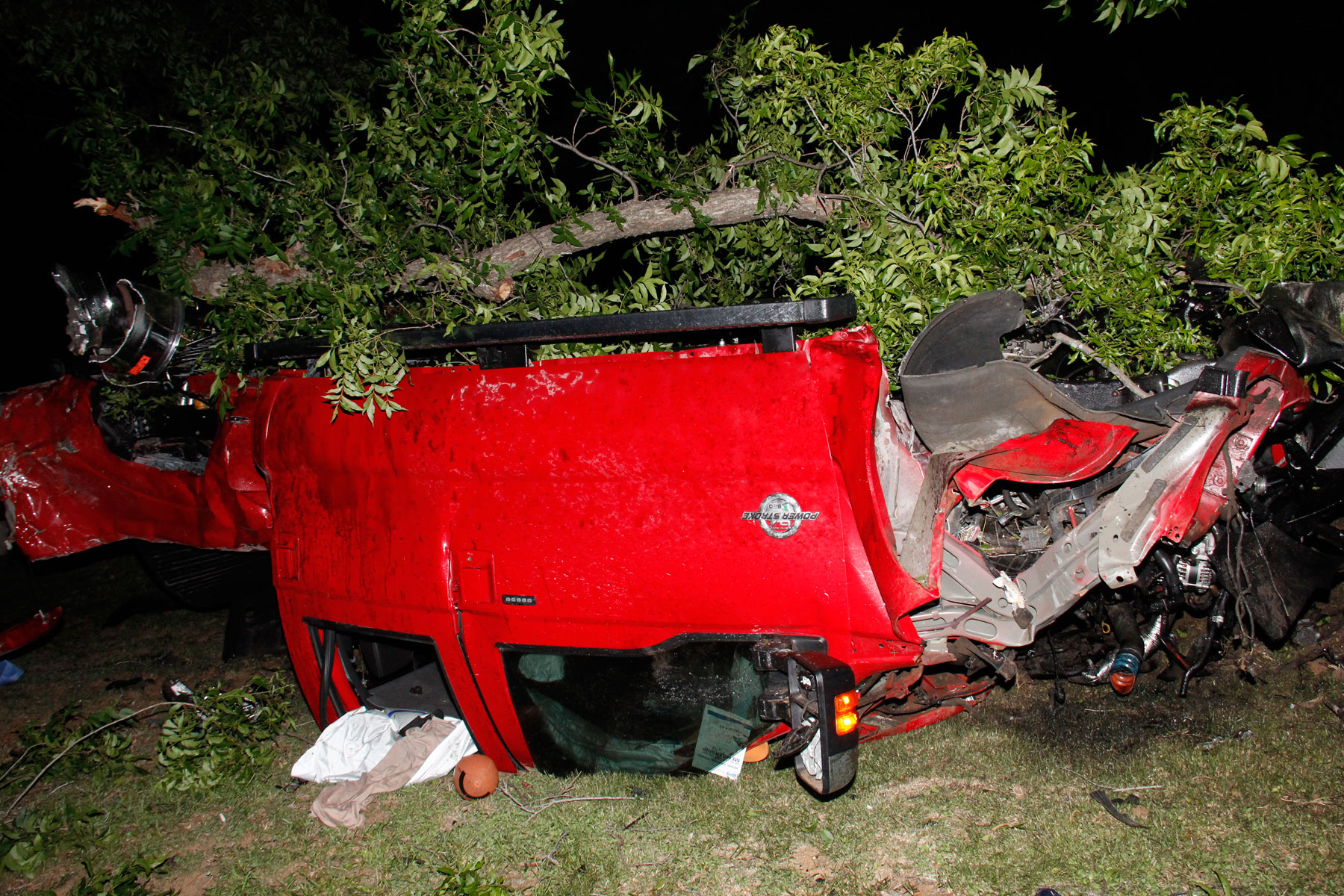
“When his mother first brought him out to me, he was 9,” Anderson says. “Her whole reason for bringing him to me was just—she didn’t want Ethan to turn out like the others. She wanted better for him.”
She says Tonya’s biggest problem was that “she loved the boy so much that she couldn’t say no to him. If you’re raising young men, you’ve got to learn to say no.” Of Fred, she says, “He needed counseling, but he probably would have thought he was smarter than the counselor anyway.”
Over the years, Anderson saw Ethan’s parents get into more than one screaming match in the parking lot, almost always in front of the boy. One time, as they yelled at each other, Fred locked the doors of his truck with Ethan inside and threatened to speed away. The police showed up, but nobody got in trouble.
Fred always had a short fuse. “He’d been angry since childhood,” a psychologist testified. “He was a big guy, kind of rednecky, didn’t take no shit from nobody. And so there’s a litany of times where he had disagreements with people, and he wants to go outside and settle it. And he has roughed people up. And he’s loud.”
He was born in West Virginia but graduated from high school in Mineral Wells in 1983. He was a 17-year-old senior when he met the woman who’d become his first wife, Gaye. She was 30. By the time he was 21, he was the president and owner of Cleburne Sheet Metal, which does large-scale metal roofing. It’s not clear where he got the capital to start the business, but the company now employs about 40 people, and its website shows photos of completed commercial jobs all across North Texas. During a deposition, Fred was asked if, during a 1992 DWI stop, he had told a police officer, “I make more in a day than you make in a year.” His answer: “Probably.”
Tonya was born in Paris, Texas, and quit school when she was 15. She was married and pregnant by 18 and divorced less than 10 years later. Two children from her first marriage were in and out of the home she shared with Fred from the time Ethan was an infant. And she has her own arrest record, which includes a charge of reckless driving for running a car off the road. She got her GED and worked briefly as a vocational nurse, then periodically ran errands and answered phones for Fred’s company.
After spending more than 50 hours with the Couches, a psychologist thought the family was “profoundly dysfunctional.”
When Ethan started at the Anderson School, Tonya would go on field trips with the kids. LeVonna Anderson remembers Tonya was always willing to buy the other kids’ lunches and that she helped pay for the school’s tornado shelter. “She was always very generous, and she was never pretentious,” Anderson says.
Fred and Tonya met at Lake Pat Cleburne—they disagree on exactly when—and dated for a short time before getting married in 1996. Ethan was born in April of 1997.
Anderson remembers the boy’s soft voice and how happy he seemed to be when he was at school. “He was this cute little kid,” she says. “He wanted to make me happy. He wanted to make my job easier. I don’t remember him being mean to someone even once.” Ethan was a great student, especially in math. Anderson says he could have gone on to work at NASA.
He also seemed drawn to the less academically inclined. It was at the Anderson School that he befriended two of the boys who wound up riding in the F-350 on the night of the crash. Both of those kids were eventually asked to leave the school. Avery, the older boy, had financial and academic issues. Garrett, who would become Ethan’s best friend, was accused of threatening another child.
One day, when Ethan was 13, Anderson noticed that he’d driven himself to school. She was concerned and talked to Fred about it. The father didn’t react well. “He told me that Ethan was the best driver he knew,” she says. “He was adamant that Ethan was going to drive to school. He believed his son was better. His son was more talented. He was the golden boy.”
Fred told her that Ethan didn’t need college anyway, that he’d take over the family business soon. According to court documents, his response to the confrontation was something along the lines of: “I’ll buy the school.” In the end, Fred pulled Ethan out and enrolled him in a homeschool co-op program in Watauga. But by the time he was 15, he was done with that, too.
Anderson testified at Ethan’s sentencing hearing and saw Fred in the hall. It was the first time she’d seen him since he’d pulled Ethan from her school. “I told his dad, ‘If Ethan had been with me, he’d be entering college this fall and not this horrendous thing.’ ”
•••
By the time of the sentencing hearing, there were seven civil suits filed against Ethan, his parents, and, because the F-350 was owned by Cleburne Sheet Metal, the lucrative family business. Eric Boyles had lost his wife and daughter in an instant. “Wiped out in his own front lawn,” his attorney, Todd Clement, said. Breanna Mitchell’s mother, Marla, who was on the phone with her at the time of the crash, has to live with the sounds of her daughter’s last words echoing in her head. Brian Jennings, the young minister demonstrating how to be a Good Samaritan, left a wife and three children. Sergio Molina, one of the two boys thrown from the bed of Ethan’s truck, was paralyzed and can now communicate only by blinking.
“Sergio was a soccer player before he met Ethan Couch,” said his attorney, Fort Worth-based William Berenson. “One night with this young man, and now his mother and brother will have to take care of him for the rest of his life.”
All but one of the suits was settled in a group mediation, with the settlements sealed. The one case that didn’t settle was Lucas McConnell’s. Lucas was one of the two boys in Brian Jennings’ truck when he got out to help. After the crash, both doors on the truck were jammed shut, and the boys were covered in shards of glass. Lucas climbed out the back window and saw things that night that no child should see. He believes he saw Ethan amid the chaos and heard him say, “I only had two beers, and I am not going to get in trouble for this.”
In late 2014, as part of that remaining civil case, both Tonya and Fred were required to sit for lengthy depositions. So was Dr. Dick Miller, the psychologist who treated Ethan and his parents after the crash and infamously used the term “affluenza” in court. He testified that, after spending more than 50 hours with the Couches, he thought the family was “profoundly dysfunctional.” He said it was clear that Fred and Tonya gave Ethan incredible freedoms, with no regard for the law, and that his abuse of alcohol and drugs had escalated for years. Miller testified that instead of the golden rule, Ethan was taught: “We have the gold, we make the rules.” He said he thought Ethan probably has an anxiety disorder he inherited from Fred. “Fred is either an asshole—aggressive, loud, pushy—or he’s frightened.” And he made it clear that both parents were complicit in enabling the boy: “Dad was addicted to mother, and mother is addicted to the kid.”
Likewise, both parents said they missed, in the words of Tonya, “big red flags.” The mother said she always left the disciplining up to the father. Sometimes Fred would take away something of Ethan’s as punishment—a video-game system or, later, a truck. But when that happened, Tonya would often give it back, or Ethan would play them off of each other. Most of the time, though, Ethan felt no consequences for his behavior.
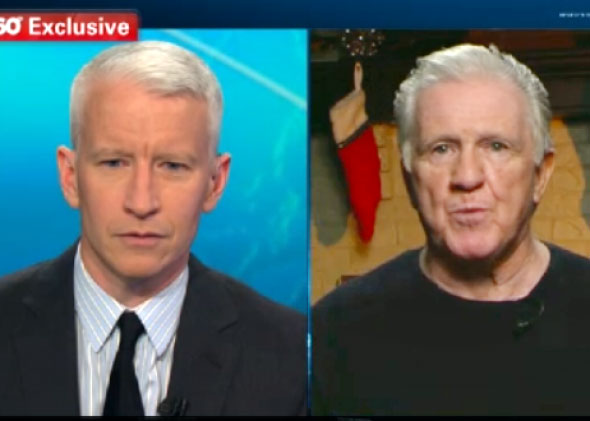
After the Watauga homeschool program, it’s not clear if Ethan graduated or if he got a GED, but he started taking community college classes and working periodically at his father’s company. Fred built a 7,000-square-foot house on 3 acres in Northwest Fort Worth. The property includes a two-story guesthouse and an even bigger workshop than the Burleson house has. And at some point, Tonya moved back in. Asked when in 2011 they remarried, Fred said, “April 24-ish.” They both noticed Ethan pulling away, getting more distant, but they assumed it was normal. By January 2013, a few months before the crash, Ethan was living by himself or with his cousin at the Burleson house a few days a week. When he stayed there, the house was empty except for a bed, a couch, an Xbox, and a big-screen TV.
His parents testified that Ethan was there to get the house ready for sale. Ethan told his friends, though, that he’d had a fight with his dad and that Fred had kicked him out of the house. Fred said he would stop by the home sometimes to check on his son, though he hadn’t been there for at least a week before the crash.
One day Fred came over early in the morning and found beer cans in the garbage. He woke up Ethan and asked who’d been drinking. Ethan told him they belonged to his older cousin, but Fred would later testify that he knew he was being lied to. On another occasion, Fred realized that Ethan had let someone drive the old Firebird parked out back, something he’d specifically forbidden. As punishment, Fred grounded Ethan from his truck, forcing the boy to walk nearly a mile each way to work and back. But Tonya let Ethan borrow her truck.
He was driving his mom’s F-150 on a night in February 2013 when a Lakeside police officer found him peeing in the parking lot of a Dollar General at 1 am. In the truck was an unclothed 14-year-old girl, a can of Miller Lite, and a 1.75-liter bottle of Grey Goose. The officer asked the clearly intoxicated 15-year-old Ethan what he was doing.
Ethan replied, “What’s it look like I’m doing?”
Tonya was called to the scene. The officer’s microphone captured the conversation between the mother and son.
“By the way, I didn’t know you snuck out,” Tonya says.
“What do you mean, I snuck out?” Ethan says. “I told you I was—”
“Well you’re not going to tell your dad that after you go out drinking and doing this,” she says.
“I drank one beer,” he says.
“It doesn’t matter,” she says.
Though he’d broken at least six laws, Ethan was only issued tickets for minor in consumption and minor in possession. Tonya drove Ethan home, leaving the truck at the Dollar General. In her deposition, Tonya was asked what happened to the girl. “That morning?” Tonya responded. “Her mom picked her up, I assume. I guess. I don’t know.” Citing the ongoing civil litigation, Lakeside Chief of Police Lee Pitts declined to comment on the incident.
Dr. Miller testified that the February episode set the stage for the crash in June. Tonya covered for Ethan and lied to Fred. She paid Ethan’s fines and court fees, and when he didn’t complete the required alcohol awareness class and community service hours, she said it was her fault, that she’d “misread the online thing.” Miller also testified that Ethan’s drinking and cocaine use increased between February and the weekend of the crash, a few months later.
For his treatment of Ethan and testimony in the criminal case, Miller was paid $15,560. He has said repeatedly that he regrets using the word “affluenza” at the sentencing hearing. More than anything, the word distracts from his point, that this sort of behavior happens all the time. It’s just that the results are rarely so tragic. In the last 15 years, academics have begun studying the effects of affluence on young people. A 2013 Psychology Today cover story titled “The Problem With Rich Kids” explains that children in affluent suburbs are more likely to experience clinically significant levels of depression and higher rates of anxiety and substance abuse. They are also more likely to cheat in school and to steal from their parents and peers. In his deposition, Miller said that the circumstances he was describing—spoiled kids with access to money and drugs—are common, especially in the suburbs. Specifically, he said, Highland Park High School, Allen High School, and Plano Senior High School are full of these kids.
Both parents testified that they’d forgotten Ethan was a child.
“He took care of all the tasks and all the chores that I expected him to,” Fred said. “I didn’t count on the fact that my kid is still a kid.”
“I thought he was more grown up than he was,” Tonya said. “I felt like he was responsible, but he—I didn’t see that he was still just a little boy, too.”
•••
A few of the kids who were in Ethan’s truck that night didn’t return voice mails and Facebook messages. Some said they still couldn’t talk about it. One hung up as soon as he was told what the call was about. The father of Garrett, Ethan’s best friend, would say only, “We wish it would go away.” Another father gave his son permission to talk but said he didn’t think it was likely. “He doesn’t even talk to us about it,” the father said. “He’s still got a lot of problems.”
There was only one girl in the truck that night, a 15-year-old named Starr. She’d dated Ethan on and off for a few months, but by that weekend she’d started dating Garrett. “Ethan can be nice,” she says today. “But he’s also a guy, so he’s also a douchebag.”
The weekend before the crash, she was with Ethan and Garrett, drinking in the guesthouse attached to the newer house, the one in Northwest Fort Worth. She says Ethan’s mom knew everyone was there. Starr had so much to drink that she had to be told the next day what she’d done. So she didn’t feel like drinking again that following Saturday at the Burleson ranch house, where the kids were alone. But it was Garrett’s birthday, and another friend was leaving for the Army, so Ethan wanted to have a party.
Ethan and Garrett both worked at Fred’s company that day. They left in the late afternoon and picked up Starr on the way back to the house. Ethan was driving his father’s supersize F-350 because his own Harley-Davidson-package F-150 was in the shop. Ethan told his parents that they wanted to get the grill ready for a Father’s Day cookout the next afternoon. Fred testified that when he first heard the boys wanted to set up the grill, he had a bad feeling and said no, but that Ethan and Tonya talked him into it.
When they got to the house, Ethan and Garrett took showers and posted party invites to Twitter and Facebook. Their friend Avery—the one who was about to join the Army—was the first one over. They did shots. After dinner, there were more shots, and the four of them piled into the truck to pick up some of Garrett’s friends in Keller, most of whom Ethan and Starr had never met. When they passed a freshly mowed soccer field, Ethan couldn’t resist driving the truck onto it and doing doughnuts.
On the way back to the house, they stopped at an Albertsons with a plan to steal beer, to go along with the bottle Avery brought and the bottle Ethan got from his cousin. But the security detail at the grocery store was eyeing the kids, so they left and went to a Walmart. Ethan, Avery, and Starr stayed in the truck. Surveillance footage from that night shows the other five boys picking up three cases of Miller Lite and walking out a side entrance without paying.
Back at the house, the guys blasted rap and played beer pong. They did more shots and lit fireworks in the backyard. They all planned to spend the night there. Starr says Ethan was texting his mother throughout the festivities.
After a few hours, she grew tired of the party. “It’s not that fun to watch drunk people,” she says. She also realized her period was starting, and she didn’t have any tampons. She called two cab companies, but she says nobody picked up. Ethan said he thought there might be some in one of the five bedrooms or four bathrooms, but a search turned up nothing. Ethan did another shot of Everclear and volunteered to drive her to a gas station less than a mile away.
But Ethan had just met some of the kids hours earlier, and he didn’t want to leave them alone in his house. So he told everyone to get in the truck. On the way out of the house, Ethan picked up a box fan and smashed it on the ground.
“He was showing off to people he didn’t know,” Starr says. “Like, ‘I can break stuff. It’s mine.’ ”
She told him she didn’t think he should be driving. “He was so gone,” she says. “He didn’t even know where he was.”
She watched as the boys got in. Two up front. Two in the backseat. Two in the bed.Garrett reassured her that he’d seen Ethan drive like this plenty of times before. He sat in the back with the door open, inviting her in.
She chokes up as she talks about it. Looking back, she feels like the whole thing is her fault. The only reason they were in the truck that night was to get her a tampon. “Garrett told me, ‘It’ll be fine,’ ” she says. “And I got in.”
As soon as he got out of the driveway, Ethan gunned the engine. Starr and Garrett yelled at him. Ethan laughed and started driving on the wrong side of the road. Starr yelled some more. Ethan got back into the right lane, but he overcorrected and drove onto the grass. He was less than a quarter of a mile from his house. Analysis of the truck showed it was going as fast as 74 mph when its airbags deployed. Ethan never touched the brakes.
Starr had been sitting in the backseat, on Garrett’s lap, but she regained consciousness up in the front seat, covered in broken glass and blood. She saw Ethan slumped over the wheel, and no matter how much she screamed his name, he didn’t move.
•••
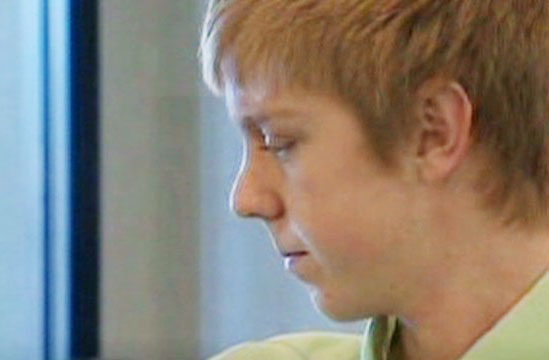
“Quite frankly,” Fred testified, “I was running out of money.”
Most people, including Miller, thought Ethan would return to Newport after the December sentencing hearing. Instead he went to a facility in Vernon, Texas, with fences and guard towers. After several months there, he was transferred to a program in Amarillo, where he’s taking classes and doesn’t see his parents very often.
In his deposition, Fred talked about the rare occasions when Ethan was allowed to come home. He said the only thing his son did was crawl into bed and curl up in a ball. As Ethan approached his 18th birthday, his parents said, he was filled with shame and regret. Fred was asked if he’d ever discussed the crash with his son. He said he’d tried, but Ethan doesn’t get far before he breaks down and can’t talk.
LeVonna Anderson worries Ethan will try to hurt himself. She said as much during the sentencing hearing, and Ethan nodded.
“Deep down, he’s an extremely smart, sensitive kid,” she says today. “There’s no way the magnitude of this has hit him yet, and when it does, I’m not sure he’ll be able to live with himself.” She says it’s a shame all the blame has been focused on Ethan when there are so many people who could have prevented this: parents, police officers, peers. “Lots of kids will be driving around with trucks full of their friends this weekend and every weekend. We just hope they don’t run off the road.”
Though it was controversial, Ethan’s sentence is consistent with most juvenile DWI manslaughter cases in Texas, at least where first time offenders are concerned. “Very infrequently does a nonviolent, non-intentional crime land a juvenile in jail,” says Michael Yanof, one of Ethan’s attorneys. “Not to say this isn’t serious. It’s very serious. But it wasn’t violent or intentional, and the preference of the state is to not send juveniles to jail.” He adds: “Studies show that once you send somebody to jail, particularly as a juvenile, they tend to stay a criminal.”
When Ethan turns 19, the court will hold a hearing to determine whether his case will be carried over to the adult justice system. Attorneys involved in the case have suggested that his probation sentence makes that carry-over more likely. If Ethan is transferred to an adult court, he won’t be allowed to drive or drink at all until he’s 26. If he does, he’ll face the possibility of 10 years in prison.
As for Ethan’s friends, Garrett left school and, as of last year, was working as a cook at Sonic. Avery left the Army and moved out of state. Starr is now a mother.
Fred and Tonya split up again a few months after the crash. The stress was overwhelming. In the summer of 2014, Fred was charged with impersonating a police officer in North Richland Hills. The circumstances aren’t clear, and his attorney advised him not to answer questions about the incident during his deposition. But apparently officers responded to a disturbance call in the middle of the night, and, when they arrived, Fred was there. He identified himself as a Lakeside police officer. One of the officers happened to have worked in Lakeside and didn’t remember him. When Fred showed them a badge, they let him go, but the officer called the Lakeside chief later and confirmed that Fred was not on the force.
A warrant was issued for his arrest, and he turned himself in. Within a few minutes, he paid a $2,500 bail and walked away.


